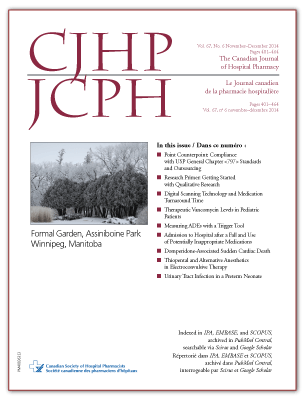Influence of Admission to a Tertiary Care Hospital after a Fall on Use of Potentially Inappropriate Medications among Older Patients
DOI:
https://doi.org/10.4212/cjhp.v67i6.1405Keywords:
falls, potentially inappropriate medications, older adults, hospital admission, chutes, médicaments potentiellement inappropriés, personnes âgées, hospitalisationAbstract
ABSTRACT
Background: Each year, about one-third of individuals over the age of 65 years will experience a fall, and half of these will experience a subsequent fall in the following year. The use of potentially inappropriate medications (PIMs) is an important factor contributing to increased fall risk in geriatric patients.
Objective: To determine the proportion of patients over the age of 65 admitted to orthopedics and general medicine services with diagnosis of a fall who experienced a change in the total number or dosage of PIMs, as defined by the Beers criteria, upon discharge from hospital.
Methods: This retrospective observational study involved patients admitted to a tertiary care hospital with diagnosis of a fall between January 1 and December 31, 2011. Those aged 65 years or older with at least one PIM on admission were eligible for inclusion. Data analysis included 2 and Fisher testing, as well as multivariate analysis.
Results: A total of 148 patients were included, of whom 63 (43%) had an overall change in the dosage or number of PIMs during their hospital stay. Forty patients (27%) had an overall reduction in the dosage or number of PIMs upon discharge from hospital, whereas 23 (16%) experienced an overall increase in the dosage or total number of PIMs. The mean number (± standard deviation) of PIMs decreased during the hospital stay, from 1.6 ± 0.8 on admission to 1.4 ± 0.9 on discharge (p = 0.03). Benzodiazepines were the class of PIMs most frequently discontinued or reduced in dosage.
Conclusion: One-quarter of patients admitted with falls had de-escalation of PIMs upon hospital discharge. Although dosage reduction or drug discontinuation may not be appropriate for all patients, a standardized approach to medication review during the hospital stay and improved prescriber education and awareness of PIM use among elderly individuals are warranted.
RÉSUMÉ
Contexte : Chaque année, environ le tiers des personnes de plus de 65 ans subiront une chute et la moitié d’entre elles chuteront de nouveau au cours de l’année suivante. Or, l’utilisation de médicaments potentiellement inappropriés (MPI) représente un facteur important d’augmentation des risques de chute chez le patient âgé.
Objectif : Déterminer la proportion des patients de plus de 65 ans admis aux services de médecine générale et d’orthopédie en raison d’un diagnostic de chute pour qui le nombre ou la posologie de MPI, selon les critères de Beers, avaient changé au moment du congé.
Méthodes : Cette étude d’observation rétrospective a porté sur des patients ayant subi une chute et ayant été hospitalisés dans un centre hospitalier de soins tertiaires entre le 1er janvier et le 31 décembre 2011. Parmi ceux-ci, seuls les patients âgés de 65 ans ou plus chez qui l’on a
noté au moins un MPI au moment de l’hospitalisation étaient admissibles. L’analyse des données reposait sur le test du 2, le test de Fisher ainsi que
sur une analyse multivariée.
Résultats : En tout, 148 patients ont été retenus. Parmi eux, 63 (43 %) ont connu un changement à la posologie de MPI ou au nombre de ces derniers au cours de leur séjour à l’hôpital. On a noté au moment du congé que 40 patients (27 %) avaient fait l’objet d’une réduction globale de la posologie de leurs MPI ou du nombre de ceux-ci et que 23 patients (16 %) avaient connu une augmentation globale de la posologie de leurs MPI ou du nombre de ceux-ci. Le nombre moyen (± l’écart-type) de MPI a diminué au cours du séjour à l’hôpital, passant de 1,6 ± 0,8 au moment de l’hospitalisation à 1,4 ± 0,9 au moment du congé (p = 0,03). Les benzodiazépines représentaient la classe de MPI qui était la plus fréquemment interrompue ou dont la posologie était la plus souvent réduite.
Conclusions : Le quart des patients hospitalisés pour une chute avait fait l’objet d’un allégement de MPI au moment du congé. Bien qu’une réduction de la posologie ou l’interruption de la prise d’un médicament ne soient pas nécessairement recommandées pour tous les patients, il est justifié d’adopter une approche standardisée de l’évaluation de la médication pendant le séjour à l’hôpital, et de mieux instruire et sensibiliser les prescripteurs sur les enjeux liés aux MPI chez les personnes âgées.
Downloads
Published
Issue
Section
License
Copyright © Canadian Society of Healthcare-Systems Pharmacy.
After publication of a manuscript in the CJHP, the authors of the manuscript must obtain written permission from the CSHP (publications@cshp.ca) before reproducing any text, figures, tables, or illustrations from the work in future works of their own. If a submitted manuscript is declined for publication in the CJHP, all said rights shall revert to the authors. Please note that any forms (e.g., preprinted orders and patient intake forms) used by a specific hospital or other health care facility and included as illustrative material with a manuscript are exempt from this copyright transfer. The CJHP will require a letter from the hospital or health care facility granting permission to publish the document(s).










